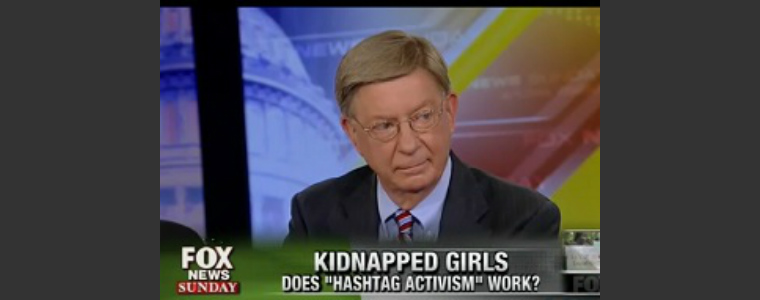On today’s Fox News Sunday, George Will and Brit Hume gave the #BringBackOurGirls awareness-raising campaign for the kidnapped Nigerian schoolgirls what they intended to be a serious intellectual beat-down:
“Do you think that this is significant and helpful and can make progress?” [Hume] asked. “Or do you think it’s really about helping the people that tweet the hashtag feel better about themselves?”
“Exactly that,” Will responded unreservedly. “It’s an exercise in self-esteem. I don’t know how adults stand there, facing a camera, and say, ‘Bring back our girls.’ Are these barbarians in the wilds of Nigeria supposed to check their Twitter accounts and say ‘Uh-oh, Michelle Obama is very cross with us, we better change our behavior.'”
“Power is the ability to achieve intended effects,” he explained…
“Self-esteem” is of course a common Will punching bag, and in typical tired style he proceeded to tie online activism to another of his personal bugaboos, the slow death of the incandescent light bulb. But besides a you-kids-get-off-my-lawn mentality, the exchange reveals a serious misunderstanding of what online activism intends to do. To reference a communications medium Will DOES relate to, #BringBackOurGirls is a modern version of Uncle Tom’s Cabin, a novel that went a long way toward starting the American Civil War and ending plantation slavery in the United States.
Lincoln may not have actually greeted its author, Harriet Beecher Stowe, with the words “so you’re the little lady who started this great war,” but her book did personalize the horrors of American slavery for millions of readers. And by doing so, it and fellow travelers like Twelve Years a Slave helped to catalyze the anti-slavery sentiment that brought Lincoln into office and the South into secession. If “power is the ability to achieve intended effects,” Uncle Tom’s Cabin had real power — quantified in the form of more than 600,000 soldiers dead, millions of slaves set free and a centuries-old social and economic system destroyed…or at least, started down that long road.
#BringBackOurGirls is the spiritual successor of books Uncle Tom’s Cabin and Twelve Years a Slave: just like them, it’s in a part an awareness-raising campaign making use of the effective communications media of its era. And in the modern world, just as in the 19th Century, awareness-raising can BE a channel to power projection. At least one one person on the Fox panel does understand this dynamic:
“I do think that you have to take this for what it is,” Associated Press’ Julie Pace said. “I don’t think anyone is saying that by standing there taking a picture of yourself holding a sign, you’re going to get these girls back. But you have to remember, this is something that had really not been talked about, not even by the Nigerian government itself, before this started to really take hold on social media. Now, what it has done is put some pressure on the Nigerian government to accept some international assistance.”
Exactly. To bring George Will up to speed, here’s the route to power: social media yields public attention, public interest yields communication of people’s interest to their government, public pressure yields goverment reacion in the form of pressure/assistance directed at the entity in question. It doesn’t always work (hell, it RARELY works in the short term), but it IS a viable route to changing the world, and not just an exercise in self-congratulatory narcissm.
In this case, let’s think through the longer-term effects of a campaign like #BringBackOurGirls, regardless of whether or not it helps to free a single one of the kidnapped Nigerians. What happens if activists can tie human rights horrors like the this one with other consequences of the same kind of lawlessness, like the impending extinction of African elephants in the wild? Just perhaps, their work could spark an international consensus that leads to the establishment of the rule of law in the vast areas of the world whose inhabitants now suffer terribly from its lack. That result would sound like an exercise in power to me — one of the oldest in the book.
Next up, the “self esteem” that online activism inspires in its participants: I’d argue that it’s a feature, not a bug. It turns out that doing good things makes people feel good, which is one reason that we donate to churches and charities. Would Will have us stop giving money to any cause, simply because part of our motive to do so is the warm fuzzing feeling we get from it?
Positive reinforcement helps to keep people active…at least up to the point that they stop seeing that their actions have meaningful effects in the real world. And that’s the real check on the passion underlying any kind of activism: if you can’t persuade people that their actions have some realistic path to success, or at least SOME kind of beneficial results, they’ll lose that self-loving feeling and drift off to another cause or interest.
Other causes there certainly will be: Uncle Tom’s Cabin and Twelve Years a Slave may have helped create the conditions that led to the end of slavery, but exorcising its ghosts would be the work of future generations of activists…including our own. And like Harriet Beecher Stowe, we’ll use the technology of our time. Otherwise, we’d be just as foolish and short-sighted as George Will sounded today.
– cpd


[…] good friend Coin Delany over at ePolitics.com squared off against George Will this past weekend over Will’s rather weak criticism of Michelle Obama and about 3 million other […]
[…] good friend Colin Delany over at ePolitics.com squared off against George Will this past weekend over Will’s rather weak criticism of Michelle Obama and about 3 million other […]
[…] #BringBackOurGirls: Esteem-Building or Effective? (a response to an article that should look familiar) […]